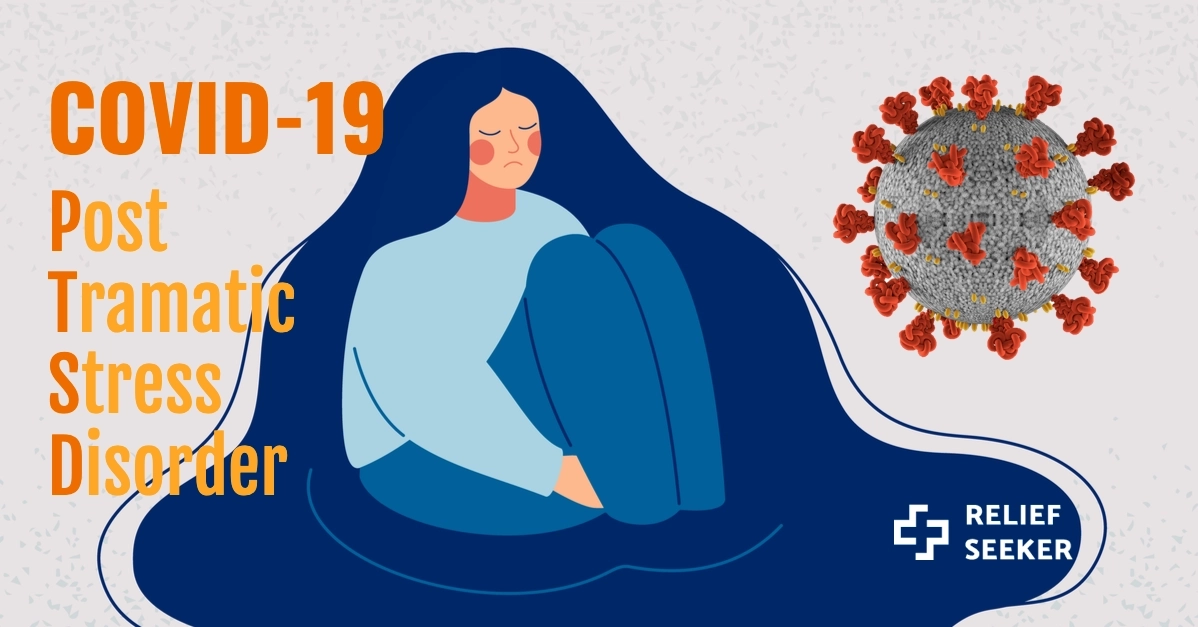The COVID-19 pandemic has caused more than 170,000 deaths in the US alone. It has ravaged the economy, and many industries fear they won’t be able to bounce back. The trauma of this virus has caused a spike in mental disorders and may even lead to a rise in post-traumatic stress disorder (PTSD) cases.
From frontline healthcare workers to coronavirus survivors (and non-essential workers quarantined at home), it seems that no one is exempt from COVID-19 PTSD. Find out if you’re at risk and what you can do about it.
Post Traumatic Stress Symptoms (PTSS) in Wuhan, China
As the rest of the world considers the new normal, many countries are looking to China (specifically Wuhan, where COVID-19 is thought to have originated) to understand what to expect.
Already, many Chinese residents are experiencing acute posttraumatic stress symptoms (PTSS).
The Naval Medical University in Shanghai, China conducted an online anonymous questionnaire and included 2,091 Chinese. The findings? “The prevalence of PTSS among the public in mainland China 1 month after the COVID-19 outbreak was 4.6%,” and “results showed that some Chinese showed acute PTSS during the COVID-19 outbreak.”
The study was conducted during the months of January and February, and though more information needs to be gathered, the preliminary results show that the pandemic did affect the mental health of those in China — and Wuhan specifically.
PTSD in Coronavirus Patients
Here in the U.S., doctors are equally worried about patients who survived the virus. Emergency rooms are currently in a heightened state of stress. Patients walk into the emergency room not knowing if they’ll come back out or if they’ll see their families again. Some people at high risk (such as the elderly or those with preexisting conditions) fear ‘dying alone’ more than the virus itself.
The staff at one hospital allowed the wife of one 49-year old coronavirus patient to enter the room in protective gear when it seemed he wasn’t going to survive the virus. After the man’s wife sat with him for several hours, the patient started turning a corner.
Is the isolation of this disease one of the factors of the high death rate? At this point, it’s impossible to know since allowing family into hospital rooms right now could conceivably increase infection rates.
Still, doctors do believe that PTSS and PTSD rates will be higher in coronavirus patients. After the SARS outbreak, patients who were quarantined exhibited higher rates of PTSD symptoms than those who were not.
PTSD in Frontline Healthcare Workers
Frontline healthcare workers are seeing higher risks of mental trauma, too. A New York City emergency room doctor died by suicide after contracting the virus and making a full recovery.
Frontline healthcare workers are especially at high risk for COVID-19 PTSD symptoms as they spend long hours caring for patients who won’t ever make it out of the ER. In past cases of frontline workers in rescue and recovery (such as the terrorist attacks of 9/11), responders were at higher risk of developing depression, anxiety, and addiction.
Even workers that are considered essential (though not working directly with the virus itself), such as mail carriers, grocery store clerks, and food service employees, may have a higher risk of developing symptoms as well.
Quarantine Stress
Even those of us simply quarantined or sheltered in place have a higher likelihood of developing PTSS or PTSD as the result of the pandemic. Uncertainty, fears of being infected, and financial stress can lead to a higher risk of PTSD and mental health disorders.
Additionally, many people are also at a higher risk of other types of stress, too.
Intimate partner violence is on the rise. Those who have nowhere to go and are the victims of abuse in the home are at a higher risk for COVID-19 PTSD, depression, and suicide. Families that rely on social services to get access to meals and housing (low-income families, the homeless, etc.) are also at higher risks of stress disorders, attention deficit disorders (ADD), and depression.
Those who were already suffering from disorders such as bipolar disorder or atypical depression are now at a higher risk for suicide or self-harm.
COVID-19 Post Traumatic Stress/Disorder Symptoms
Concerned your coronavirus stress might be PTSS? One of the most common symptoms of PTSD is flashbacks of the trauma. It may be too soon to tell if you’re suffering from this symptom (since we’re still in the crux of the pandemic). Other symptoms of PTSS and PTSD include:
- Avoiding thoughts, places, and things that remind you of the trauma
- Bad dreams
- Blocking memories of the trauma
- Insomnia and other sleep disorders
- Feelings of guilt and/or blame
- Loss of interest in activities and people
- Scary thoughts
- Sudden mood changes
If you’re experiencing any of the above symptoms (related or unrelated to the COVID pandemic), you should contact a mental health professional to help you work through these emotions.
Intense feelings that aren’t worked through often resurface as depression, stress, and chronic pain. Dealing with these feelings sooner rather than later can prevent related illnesses and complications. Other medical and mental disorders that are on the rise because of the coronavirus include eating disorders, self-harm disorders, and drug and alcohol abuse.
Online Telemental Healthcare Providers
Several online telemental healthcare providers are offering free and reduced-fee services for frontline healthcare workers, COVID-19 patients, and anyone directly suffering from the pandemic. Free services vary by online mental health platform but are generally reserved for:
- Frontline healthcare workers
- Essential workers
- COVID-19 patients and close family members
- Anyone affected by coronavirus deaths
Talkspace
The famous online mental health platform now hosts a COVID-19 help center with resources and advice to get people through the pandemic. Some of the benefits include a free Facebook online support group and articles on every coronavirus worry under the sun.
Betterhelp
One of the largest telemental health providers out there, Betterhelp now has a growing number of articles on stress management in times of COVID.
COVID-19 Emotional Support Hotline
New York Governor Andrew Cuomo started a free coronavirus mental help support line (staffed by volunteer medical professionals) to help get Americans through this crisis.
If you’re worried about COVID-19 related PTSD and how it might affect your mental health, we recommend reaching out to an online mental health therapist.


